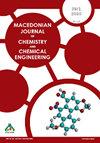伏安法在生物医学中的应用——酶伏安法的最新进展
IF 0.6
4区 化学
Q3 CHEMISTRY, MULTIDISCIPLINARY
Macedonian Journal of Chemistry and Chemical Engineering
Pub Date : 2020-11-12
DOI:10.20450/mjcce.2020.2152
引用次数: 19
摘要
蛋白质膜伏安法(PFV)被认为是研究亲脂性氧化还原酶在水环境中的电化学最简单的方法。通过在工作电极表面固定特定的氧化还原酶,有可能深入了解酶的作用机制。PFV方法可以获得酶-电极反应和酶-底物相互作用的相关热力学和动力学参数,这对于更好地理解生命系统中的许多代谢途径和描述酶的生理作用非常重要。PFV还为设计特定的生物传感器、简单的医疗设备和生物燃料电池提供了有用的重要信息。在当前的综述中,我们重点介绍了PFV的一些最新成果,同时提出了一些有助于氧化还原酶和工作电极之间更好通信的新方案。还提供了几个新的理论模型的见解,这些模型为研究固定化酶的电极反应提供了一个简单的策略,并使酶-底物相互作用的动力学和热力学表征成为可能。此外,我们从方波伏安法的角度对几种新型伏安技术进行了简要概述,这些技术似乎是在PFV中应用的有前途的工具。本文章由计算机程序翻译,如有差异,请以英文原文为准。
Application of voltammetry in biomedicine - Recent achievements in enzymatic voltammetry
Protein-film voltammetry (PFV) is considered the simplest methodology to study the electrochemistry of lipophilic redox enzymes in an aqueous environment. By anchoring particular redox enzymes on the working electrode surface, it is possible to get an insight into the mechanism of enzyme action. The PFV methodology enables access to the relevant thermodynamic and kinetic parameters of the enzyme-electrode reaction and enzyme-substrate interactions, which is important to better understand many metabolic pathways in living systems and to delineate the physiological role of enzymes. PFV additionally provides important information which is useful for designing specific biosensors, simple medical devices and bio-fuel cells. In the current review, we focus on some recent achievements of PFV, while presenting some novel protocols that contribute to a better communication between redox enzymes and the working electrode. Insights to several new theoretical models that provide a simple strategy for studying electrode reactions of immobilized enzymes and that enable both kinetic and thermodynamic characterization of enzyme-substrate interactions are also provided. In addition, we give a short overview to several novel voltammetric techniques, derived from the perspective of square-wave voltammetry, which seem to be promising tools for application in PFV.
求助全文
通过发布文献求助,成功后即可免费获取论文全文。
去求助
来源期刊
CiteScore
1.60
自引率
20.00%
发文量
14
审稿时长
>12 weeks
期刊介绍:
Macedonian Journal of Chemistry and Chemical Engineering (Maced. J. Chem. Chem. Eng.) is an official publication of the Society of Chemists and Technologists of Macedonia. It is a not-for-profit open acess journal published twice a year. The journal publishes original scientific papers, short communications, reviews and educational papers from all fields of chemistry, chemical engineering, food technology, biotechnology and material sciences, metallurgy and related fields. The papers published in the Journal are summarized in Chemical Abstracts.

 求助内容:
求助内容: 应助结果提醒方式:
应助结果提醒方式:


